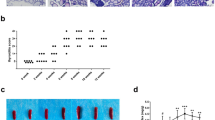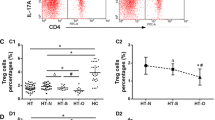Abstract
Iodine is an essential trace element for thyroid hormone synthesis and metabolism, either low or high intake may lead to thyroid disease, but the pathogenetic mechanisms by which iodine interacts with the thyroid autoimmune are poorly understood. We investigated the dynamic changes of CD4+CD25+ regulatory T cells in NOD.H-2h4 mice with iodine-induced autoimmune thyroiditis (AIT), and explore potential immune mechanism of AIT induced by iodine. NOD.H-2h4 mice were randomly divided into two groups, and received plain water or water containing 0.005% sodium iodide. Eight weeks after iodine provision, the incidences of thyroiditis, relative weights of thyroids, and serum thyroglobulin antibody titers in the iodine-supplied groups were significantly increased compared to the control groups (p < 0.05). The AIT mice had fewer CD4+CD25+Foxp3+ T cells and reduced Foxp3 mRNA expression in splenocytes compared with the controls (p < 0.01), and maintained relatively low levels during the development of thyroiditis. The changes described above aggravated gradually with the extension of iodine treatment. These data suggest that CD4+CD25+ regulatory T cells may be involved in the pathogenesis and development of AIT induced by iodine.





Similar content being viewed by others
References
Weetman AP (1997) Hypothyroidism: screening and subclinical disease. BMJ 314:1175–1178
Burek CL, Talor MV (2009) Environmental triggers of autoimmune thyroiditis. J Autoimmun 33:183–189
Bastemir M, Emral R, Erdogan G et al (2006) High prevalence of thyroid dysfunction and autoimmune thyroiditis in adolescents after elimination of iodine deficiency in the Eastern Black Sea. Region of Turkey. Thyroid 16:1265–1271
Laurberg P, Jorgensen T, Perrild H et al (2006) The Danish investigation on iodine intake and thyroid disease, DanThyr: status and perspectives. Eur J Endocrinol 155:219–228
Teng WP, Shan Z, Teng X (2009) Effects of an increased iodine intake on thyroid diseases: epidemiological study from China. In: Preedy VR, Burrow GN, Ross Watson R (eds) Comprehensive handbook of iodine. Elsevier, Amsterdam, pp 1213–1220
Teng W, Shan Z, Teng X et al (2006) Effect of iodine intake on thyroid diseases in China. N Engl J Med 354:2783–2793
Rasooly L, Burek CL, Rose NR (1996) Iodide-induced autoimmune thyroiditis in NOD-H-2h4 mice. Clin Immunol Immunopathol 81:287–292
Braley-Mullen H, Sharp GC, Medling B et al (1999) Spontaneous autoimmune thyroiditis in NODH-2h4 mice. J Autoimmun 12:157–165
Zhu J, Paul WE (2008) CD4 T cells: fates, functions, and faults. Blood 112:1557–1569
Teng XC, Jia XK, Fan CL et al (2007) Extraction, purification and identification thyroglobulin of mouse. Chin J Mod Med 17:1467–1469
Allen EM, Appel MC, Braverman LE (1986) The effects of iodide ingestion on the development of spontaneous lymphocytic thyroiditis in the diabetes-prone BB/W rats. Endocrinology 118:1977–1981
Papanastasiou L, Vatalas IA, Koutras DA et al (2007) Thyroid autoimmunity in the current iodine environment. Thyroid 17:729–739
Laurberg P, Cerqueira C, Ovesen L et al (2010) Iodine intake as a determinant of thyroid disorders in populations. Best Pract Res Clin Endocrinol Metab 24:13–27
Fischer PW, Campbell JS, Giroux A (1989) Effect of dietary iodine on autoimmune thyroiditis in the BB Wistar rats. J Nutr 119:502–507
Sundick RS, Bagchi N, Brown TR (1996) The obese strain chicken as a model of human Hashimoto’s thyroiditis (review). Exp Clin Endocrinol Diabetes 104(suppl 3):4–6
Sakaguchi S, Yamaguchi T, Nomura T et al (2008) Regulatory T cells and immune tolerance. Cell 133:775–787
Kong YC, Morris GP, Brown NK et al (2009) Autoimmune thyroiditis: a model uniquely suited to probe regulatory T cell function. J Autoimmun 33:239–246
Morris GP, Yan Y, David CS et al (2005) H2A- and H2E-derived CD4+CD25+ regulatory T cells: a potential role in reciprocal inhibition by class II genes in autoimmune thyroiditis. J Immunol 174:3111–3116
Yu S, Maiti PK, Dyson M et al (2006) B cell-deficient NOD.H-2h4 mice have CD4 + CD25+ T regulatory cells that inhibit the development of spontaneous autoimmune thyroiditis. J Exp Med 203:349–358
Nakahara M, Nagayama Y, Saitoh O et al (2009) Expression of immunoregulatory molecules by thyrocytes protects nonobese diabetic-h2h4 mice from developing autoimmune thyroiditis. Endocrinology 150:1545–1551
Morris GP, Brown NK, Kong YC (2009) Naturally-existing CD4+CD25+Foxp3+ regulatory T cells are required for tolerance to experimental autoimmune thyroiditis induced by either exogenous or endogenous autoantigen. J Autoimmun 33:68–76
Martin AP, Marinkovic T, Canasto-Chibuque C et al (2009) CCR7 deficiency in NOD mice leads to thyroiditis and primary hypothyroidism. J Immunol 183:3073–3080
Acknowledgments
This work was supported by grants from the National High Technology Research and Development Program of China (863 Program, no. 2007AA02Z4Z1), Special Research Fund for Doctor Discipline Unit of the Ministry of Education (no. 20070159007), and Key Laboratory Project of Liaoning Province (no. 2008S225).
Conflict of Interest Statement
The authors declare that they have no conflict of interest related to the publication of this manuscript.
Author information
Authors and Affiliations
Corresponding authors
Additional information
Haibo Xue and Weiwei Wang have contributed equally to this work.
Rights and permissions
About this article
Cite this article
Xue, H., Wang, W., Shan, Z. et al. Dynamic Changes of CD4+CD25+ Regulatory T Cells in NOD.H-2h4 Mice with Iodine-Induced Autoimmune Thyroiditis. Biol Trace Elem Res 143, 292–301 (2011). https://doi.org/10.1007/s12011-010-8815-x
Received:
Accepted:
Published:
Issue Date:
DOI: https://doi.org/10.1007/s12011-010-8815-x




